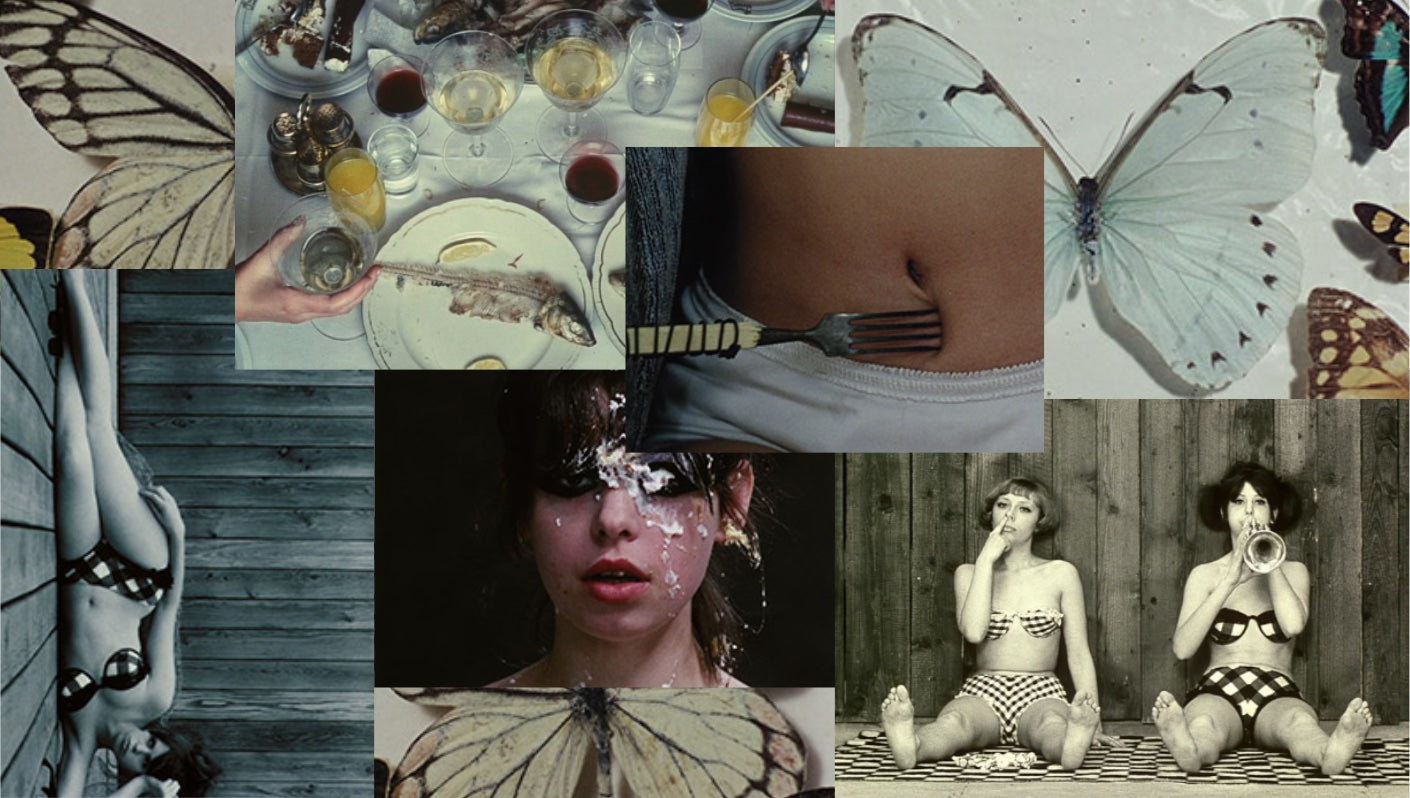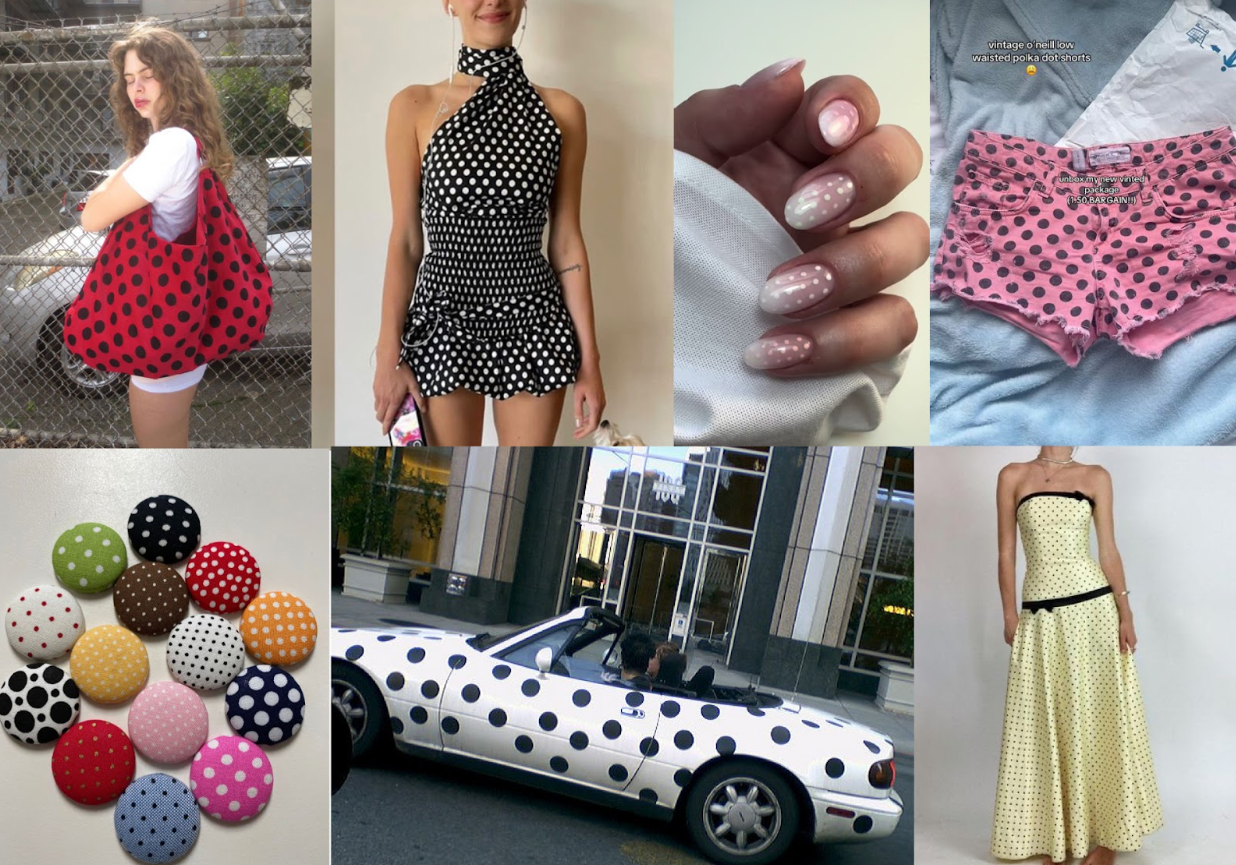Anarchy in Polka Dots: Věra Chytilová’s Daisies

By Iris Petrova...
"Everything is spoiled in the world, so we'll be spoiled too," was an idea that led to Věra Chytilová's ban from filmmaking for several years in communist Czechoslovakia during the Czech New Wave.
Sedmikrásky | Daisies (1966)
Věra Chytilová
Věra Chytilovás Daisies is a politically subversive depiction of patriarchy and totalitarianism. In this project, we follow two teenage girls, both by the name of Marie, and their pursuit of embracing absurdity. In a hyperfeminine world, the girls are dressed in 60's mod fashion, wearing heavy twiggy-esque eyeliner and surrounded by vibrant imagery emphasizing floral and other natural motifs. After realizing that no one truly cares about their existence and that the world is rotten, they throw all morals out the window and do as they please. The Marie’s participate in a kaleidoscopic rebellion filled with greed and gluttony.
Jean Shrimpton by Bert Stern for Vogue, 1965
Twiggy – The Face of 1966
The Czech New Wave began in 1963, utilizing individualism and abstract cinematography to promote social and political reform against communist and socialist ideals. Students led this period from the Film and Television School of the Academy of the Performing Arts in Prague (FAMU). Věra Chytilová, along with Miloš Forman, Jaromil Jires, and Jan Nemec, attacked traditional cinema through surreal and ambiguous creative directions. Like most fields, the film industry was dominated by men, making it that much more impactful that Chytilová pushed the boundaries.
Sedmikrásky | Daisies (1966)
Věra Chytilová
In an interview with Kate Connoly at the Guardian, Chytilová expressed her intent for promoting individualism, not necessarily feminism, "If there's something you don't like, don't keep to the rules - break them. I'm an enemy of stupidity and simple-mindedness in both men and women, and I have rid my living space of these traits."
Daisies is a quintessential portrayal of radical rebellion. Directed by Věra Chytilová, with costume design and screenwriting by Ester Krumbachová and cinematography by Jaroslav Kučera, the film presents an avant-garde comedy laced with sharp satirical critiques of a patriarchal society. Marie I and Marie II embark on a whirlwind of ultra-feminine chaos, relishing in unadulterated self-indulgence and defiance.
Throughout the film, the duo outwit sugar daddies by leaving them with hefty restaurant bills, drunkenly dance on nightclub tabletops, and infiltrate a banquet hall to launch a riotous food fight—an act of rebellion that ultimately led to the film’s censorship. Daisies was banned in Czechoslovakia during the 1960s and again following the Soviet invasion in 1969, condemned for its perceived hedonism, its subversive portrayal of women, and its biting critique of consumerism and decadence.
Sedmikrásky | Daisies (1966)
Věra Chytilová
Although the absurdist and transgressive motifs certainly piqued my interest, the psychedelic visuals and timeless costuming, hair, and makeup made me want to watch the film for a third time. The lack of a traditional plot structure, the unconventional editing style, and the use of nonprofessional actresses in the film make it feel like I'm watching the unfolding of the director's deepest thoughts & societal reflections. Every still from the movie is aggressively delicate & inspiring. I have the urge to decorate my room the same way the Marie's apartment was decorated (before they lit it on fire.)
Sedmikrásky | Daisies (1966)
Věra Chytilová
The complete disregard for men is a breath of fresh air in terms of cinema. Although the Marie’s are seemingly illustrated like marionettes with no distinctive personality traits, they constantly take advantage of men and even ridicule them in a scene where they cut up phallic-like food. Their engagement in gluttony, especially meats, subverts gender expectations. They ignore dining etiquette, stripping male authority of power. This tension between sexual politics and desire highlights the film's critique of patriarchal norms.
By rejecting gender roles and indulging in excess, the Marie’s challenge the male gaze and societal expectations of femininity, turning consumption—both literal and symbolic—into an act of defiance. This chaotic, anarchic energy blurs the lines between liberation and destruction, creating a playful yet biting commentary on gender dynamics and power structures.
Sedmikrásky | Daisies (1966)
Věra Chytilová
Trying to understand the meaning of life through an absurdist perspective, I, too, have often questioned the purpose of doing anything at all. In our modern hyper-connected and over-consumptive society, it feels like the desire for satisfaction is unattainable. Fashion cycles promote constant change, consumption, and misunderstanding of expression; social media algorithms promote a myriad of societal expectations, and anything you say, do, or create is up for criticism.
Maybe that is an incredibly pessimistic take, but it has led me to understand the value of art, interpretation, and living life in a way that creates meaning for you.
I love Daisies because it's a psychedelic trip that takes you away from reality. This film has endless fashion inspiration, insane visuals, and a reminder that you must create meaning in this world, especially as a woman. The resurgence of '60s fashion items such as mini skirts, mod dresses, fur coats, and printed tights, specifically polka dots and gingham, has allowed me to embrace the playful, rebellious spirit of Daisies in my style.
The film's chaotic energy and bohemian look remind me that fashion, like life, doesn't have to adhere to rigid rules; it's about expressing yourself unapologetically and finding joy in the absurd.
References
https://www.newwavefilm.com/international/czech-new-wave.shtml
https://www.theguardian.com/film/2000/aug/11/culture.features2
https://hero-magazine.com/article/189560/vera-chytilova
https://screenmusings.org/movie/blu-ray/Daisies/most-viewed-stills.htm
1 comment




have never seen the movie (will be watching now), but it feels like i have. love this take <3